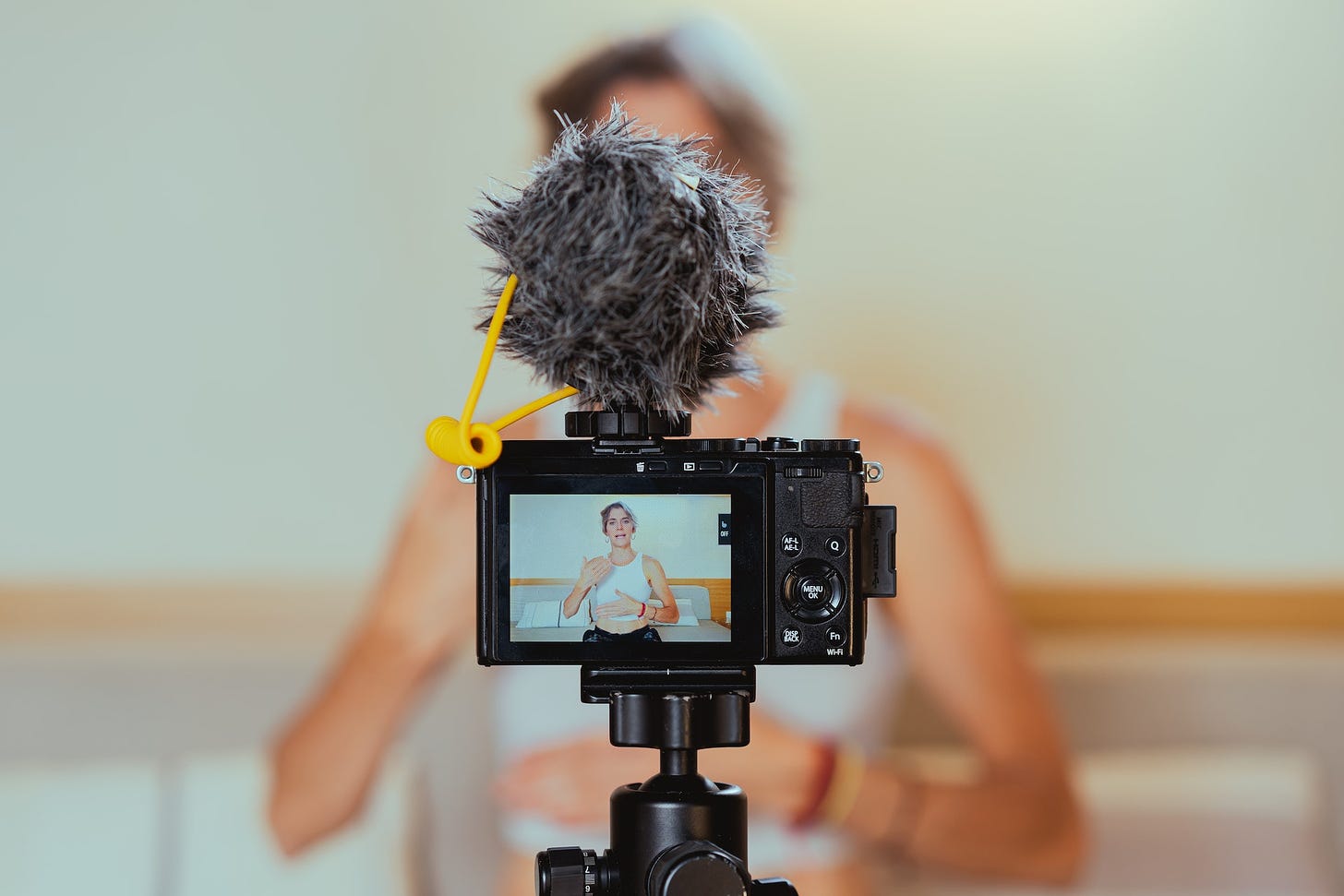This past week, I listened to the Maintenance Phase episode on Brittany Dawn, a diet influencer who was accused of scamming her followers and then pivoted into being an evangelical influencer. While the episode is fascinating and worth your time, it got me thinking about how much of ourselves we put online, the labor of putting that image together, and what’s expected from that relationship.
While some influencers have agents and managers, other online personalities are on their own. They’ve become celebrities but without the infrastructure other celebrities possess to massage their image and manage their output. Furthermore, they’re in competition with a much broader scope of online talent, since anyone with a camera and a personality can quickly collect your audience if you stop producing for even a moment.
This level of putting yourself online comes from a demand for authenticity. The person on camera forges a connection with the audience, and the audience returns with a parasocial relationship where they now feel entitled to judge and appraise the latest happenings in someone’s life. If you put part of yourself out there, that part is now available for judging. This creates a bizarre incentives to “produce” your real life like content for public consumption. So, for example, if you make videos about your relationship and only show your relationship as bright, sunny, and perfect (but also “authentically” so), then you will inevitably risk breaking the illusion as soon as you hit a rough patch in real life. We saw this play out last year with the whole Try Guys thing. Even if a relationship doesn’t go all the way to infidelity, you still have the central problem of depicting a two-dimensional reality despite people being messy, nuanced, and complicated. To quote one of my favorite movies, “Nobody knows anybody. Not that well.”
So how do you go online without hazarding yourself? In some ways, it feels like social media for the independent professional is a casino. You have to play a long time because you’ve seen the “winners”—people who have become popular enough to parlay their online success into a stable business—and maybe you could be one too! All it takes to succeed is…well, that part is never particularly clear. Maybe it’s hustle, maybe it’s luck, maybe it’s being telegenic, or maybe it’s a whole host of factors. There’s no shortage of online articles telling you how to succeed in the online space, but what are the terms of success? How much of yourself do you have to give to an online platform where even the simple act of producing content will benefit the platform but there’s far from any guarantee of a return? A good poker player isn’t guaranteed to win, but they at least know how to play the game when they pull up a chair and not be a sucker.

This isn’t even taking into account the labor of production: good camera, good lighting, good audio, etc. Essentially, do you want to just use your phone for video, or do you want to be “professional?” And does that even matter? One of the things I’ve noted as I go through TikTok is that, partially due to the nature of the platform and partially the nature of the videos themselves, the camera disappears. People with strong personalities come through to the point where you forget that they’ve set up a shot or edited together footage. Like with any good filmmaking, the screen falls away and we feel a connection with the person we’re watching.
As toxic as social media can be, on a technical level it is rather remarkable that a platform like TikTok has been able to scale this illusion to where we’re captivated by people living their lives and simply telling us things as they talk to their phone. In some ways, when the illusion shatters, it can feel incredibly lonely. People talking to themselves feels like we’ve wandered into a Mike Myers movie, where we’re playing all the roles because the only person we trust with characterization is ourselves. And yet this kind of video persists because people clearly connect with the format. We are no longer just one voice, but multiple voices engaged in a conversation with ourselves—split but still oddly isolated.
Should I Join the Horde?
I’ve considered all of this for the past month or so as I’ve weighed whether or not I should start producing videos for TikTok. But I’m a fairly cautious person, and I feel like simply strolling in without a plan could be a recipe for disaster. The notion that millions of followers are waiting for me to stroll into TikTok to talk about movies feels naïve at best and conceited at worst. I don’t want to be the sucker at the table.
So what’s my motivation? I’ve seen some pretty bad film takes come across my “For You” page, and there’s no motivator quite like “Someone is wrong on the Internet.” What I’d love to do is highlight movies that could use some more attention or context. But it’s also a visual medium, and front-of-camera work is a skill that I’m still mastering. Part of the trick of these platforms is making us think that a fun activity isn’t labor, but it is! If you’re going to put in the effort, then you should at least try to do it well.
Given all of these concerns, I’m coming to TikTok as an experiment: seeing if I can create something worthwhile while maintaining borders around my personal life. My plan is to stick to movies, making use of all the context, knowledge, and personality I’ve developed in my nearly 20 years in this business. (All the while avoiding the impulse to subscribe to the Andy Bernard school of criticism.)
I want to make something entertaining about entertainment, which is easier said that done, but I feel like it’s worth a shot.
Anyway, TikTok videos start soon. Click here to follow me.



